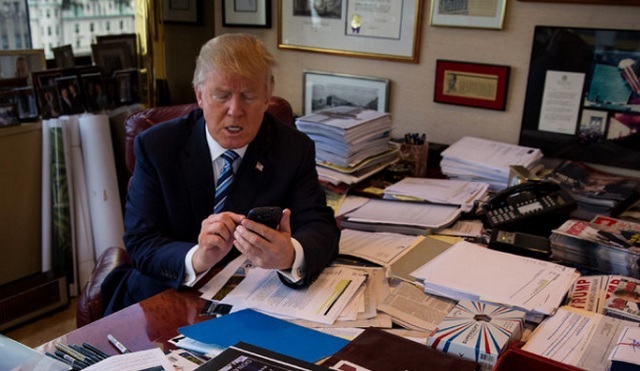
New York, United States | AFP |
US President-elect Donald Trump broke with decades of foreign policy to speak with the president of Taiwan, prompting Beijing Saturday to accuse Taipei of a ploy but saying the move would not affect US-China ties.
It was not immediately clear whether Trump’s telephone call with President Tsai Ing-wen marked a deliberate pivot away from Washington’s official “One China” stance, but fuelled fears he is improvising on international affairs.
China regards self-ruling Taiwan as part of its own territory awaiting reunification under Beijing’s rule, and any US move that would imply support for independence would likely trigger fury.
During Friday’s discussion, Trump and Tsai noted “the close economic, political and security ties” between Taiwan and the United States, according to the president-elect’s office.
“President-elect Trump also congratulated President Tsai on becoming President of Taiwan earlier this year,” it said.
China — the target of much bombastic rhetoric during Trump’s election campaign — labeled the call a “ploy by the Taiwan side that simply cannot change… the One China framework”.
“I do not think it will change the one-China policy that the US government has insisted on applying over the years,” Foreign Minister Wang Yi told Hong Kong’s Phoenix TV, in a muted response.
“The One China principle is the cornerstone of the healthy development of Sino-US relations, and we do not want any interference or disappearance of this political foundation.”
As he came under fire for the move, Trump defended his decision to speak with Tsai, saying the island’s president initiated the call and brushed off the resulting criticism.
“Interesting how the U.S. sells Taiwan billions of dollars of military equipment but I should not accept a congratulatory call,” Trump tweeted.
‘One China’
President Barack Obama’s White House said the outgoing US administration had not changed its stance.
“There is no change to our longstanding policy on cross-Strait issues,” National Security Council spokeswoman Emily Horne told reporters.
“We remain firmly committed to our ‘One China’ policy,” she added. “Our fundamental interest is in peaceful and stable cross-Strait relations.”
Washington cut formal diplomatic relations with the island in 1979 and recognizes Beijing as the sole government of “One China” — while keeping friendly, non-official ties with Taipei.
But since coming to office this year, Tsai has refused to accept the “One China” concept, prompting Beijing to cut off all official communication with the island’s new government.
Tsai’s Democratic Progressive Party government (DPP) defeated the Kuomintang (KMT), which had much friendlier ties with Beijing, in a landslide election victory in January.
Even before the call with Taiwan, Trump’s unorthodox diplomatic outreach has raised eyebrows.
Until Thursday, State Department officials told reporters that Trump had not asked for official briefing on current policy from US diplomats before making the contacts.
On Friday, department spokesman John Kirby said the outgoing US administration has now helped with “some foreign communications that the transition team has gone forward with.”
But he referred reporters to Trump’s office for details and would not say whether the president-elect himself had requested any background briefings before making or taking any calls.
Asked whether Trump was among those on the transition team who received such help, a senior US official would only say that Vice President-elect Mike Pence has also made foreign calls.
‘The right way’
The incident comes as Philippine leader Rodrigo Duterte said Trump approved of Manila’s ongoing deadly drug war, saying the crackdown in which some 4,800 people have been killed was being conducted in “the right way”.
The comments were made during a phone conversation between the Philippine president and Trump late Friday.
Traditional US ally Britain was also embarrassed when Trump tweeted a request that it replace its ambassador to Washington with his friend, euroskeptic leader Nigel Farage.
But for some critics, in extending his hand to Taiwan, Trump crossed a dangerous line.
“What has happened in the last 48 hours is not a shift. These are major pivots in foreign policy without any plan. That’s how wars start,” tweeted Democratic Senator Chris Murphy.
Cabinet posts
Murphy, a member of the Senate Foreign Relations Committee, urged Trump to speed up his search for a nominee to become secretary of state and coordinate US foreign policy.
Trump has met with several senior political, diplomatic and military figures in recent days and his pick for Washington’s next chief diplomat is keenly anticipated.
Reports suggest that former Massachusetts governor and defeated 2012 presidential candidate Mitt Romney is a frontrunner, along with former New York mayor Rudy Giuliani.
Former CIA chief and general David Petraeus has also been cited as a candidate, as have Senate Foreign Relations Committee Chairman Bob Corker and former senior diplomat John Bolton.
During the campaign, Trump repeatedly accused China of manipulating its currency to harm US manufacturing and threatened to impose tariffs on some of its exports.
Transition officials have told reporters not to expect more nominations for cabinet-level posts before next week.
 The Independent Uganda: You get the Truth we Pay the Price
The Independent Uganda: You get the Truth we Pay the Price



